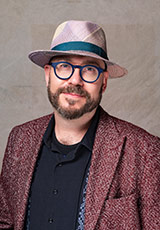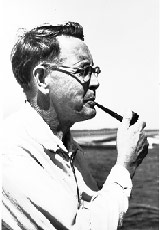Toole Lecture Series
Thursday, Nov. 9, 2023 | UNB Fredericton
8:30 a.m. - 12:30 p.m. | Toole Hall | Department of Chemistry: Faculty research meetings
1:30 - 3 p.m. | Kinesiology 215 | Open lecture: The future of chemistry is self-driving
3:30 - 5:30 p.m. | Currie Center Long Hall | Research poster symposium with reception

We are honoured to host Dr. Alán Aspuru-Guzik (University of Toronto) on Nov. 9 as the 14th F J Toole lecturer at UNB, continuing a rich and prestigious tradition. The lecture will be followed by a Poster Symposium celebrating chemistry research at UNB.
Alán Aspuru-Guzik’s research lies at the interface of computer science with chemistry and physics. He integrates robotics, machine learning and quantum chemistry to develop “self-driving laboratories”, accelerating rates of scientific discovery. Alán develops quantum computer algorithms and has pioneered quantum algorithms for the simulation of matter.
Alán is a Professor of Chemistry and Computer Science at the University of Toronto, faculty member at the Vector Institute for Artificial Intelligence and Director of the Acceleration Consortium, a University of Toronto-based strategic initiative that aims to gather researchers from industry, government and academia around topics related to the labs of the future.
Alán was previously a full professor at Harvard University where he started his career in 2006. He is currently the Canada 150 Research Chair in Theoretical Chemistry, CIFAR AI Chair at the Vector Institute and co-founder of Zapata Computing and Kebotix, two early-stage ventures in quantum computing and self-driving laboratories.
The future of chemistry is self-driving
In this talk, I will overview the growing self-driving laboratories (SDLs) field. Self-driving laboratories are systems that help accelerate the process of scientific discovery or scale-up by employing artificial intelligence and automation for experiment planning and execution. Several SDLs have been already demonstrated globally, and the field is racing towards more robust and complex applications.
I will go over essential elements of SDLs and will use examples from research from my group and collaborators as examples. In particular, I will talk about my group's work on organic lasers and organic battery development. I will also cover recent work on artificial intelligence for materials design.
I will end with a timely discussion on AI for science. What would be the criteria for advanced AI that carries out chemical experiments? At the University of Toronto, we have launched the Acceleration Consortium. This new significant initiative recently received CAD 200M in funding to accelerate self-driving laboratories for chemistry, materials science and biotechnology. I will briefly discuss what the AC is doing and how to collaborate or get involved with our efforts.
Registration for the Research Poster Symposium and reception is free but mandatory. Registration deadline: Nov. 2, 2023.
Graduate students are invited to submit research abstracts for the Research Poster Symposium to chem@unb.ca with subject line: Toole Abstract. Accepted abstracts will appear in the event program.
Dr. Francis J Toole

Born in London, England on Dec. 9, 1894, Francis James Toole (1894 to 1975) received his early education at St. Aloysius College, Highgate, London. From 1915 to 1918, he served with the 23rd London Field Ambulance and 56th London Division, emigrating to Canada after the war.
Toole enrolled in McGill University and graduated from that institution with a B.Sc. in Chemical Engineering in 1923, a M.Sc. in 1926 and a Ph.D. in 1929. While in Montreal he worked as a commercial chemist analyst (1923 to1925) and as an industrial chemist (1929 to 1930). In 1934 he married Norah Vernon Barry, daughter of Vernon Barry of Montreal.
Toole began his 35-year association with UNB in 1930, when he joined the Chemistry Department as Assistant Professor of Chemistry. The following year he was elevated to the rank of Professor of Chemistry or Head of Chemistry, a position which he held until 1963.
Toole was instrumental in guiding the department through two decades of growth and development. During the late 1940s and early 1950s, the number of chemistry students at UNB rose dramatically owing to an influx of ex-servicemen. This, in turn, necessitated the hiring of faculty and staff. Toole was largely responsible for bringing Karel Wiesner, a promising young chemist, to UNB in 1948.
A prominent advocate for graduate student research, he played a key role in establishing UNB's School of Graduate Studies in 1950. He also successfully founded scholarships and fellowships for graduate and post-doctoral students, to secure funding for research and equipment and to have the department housed in a suitable facility. In 1946 he was appointed Dean of Arts and Science, relinquishing that post in 1950 to become UNB's first Dean of Graduate Studies. He served as Dean until 1960 when he was appointed the university's first Vice-President (Academic), a post which he held until his retirement in 1965.
In addition to his academic roles, Toole supported several humanitarian causes and belonged to a number of professional organizations. He was a member of the American Chemical Society, the Chemical Institute of Canada and the Society of Chemical Industries. For a time, he also served on the Advisory Committee of the National Research Council.
Toole's outstanding contributions to the growth and development of UNB were recognized formally on a number of occasions. In 1965 the university awarded him an honorary Doctor of Science degree and the title of Professor Emeritus. The Chemistry Department honoured him again in 1970 by establishing the Francis J. Toole Lectures and in 1973 the chemistry building was renamed F.J. Toole Hall in his honour. Toole died in Fredericton on Dec. 17, 1975 at the age of 81.
